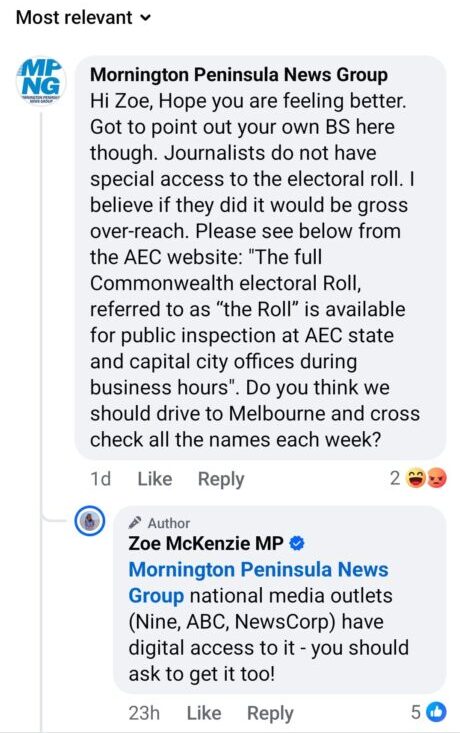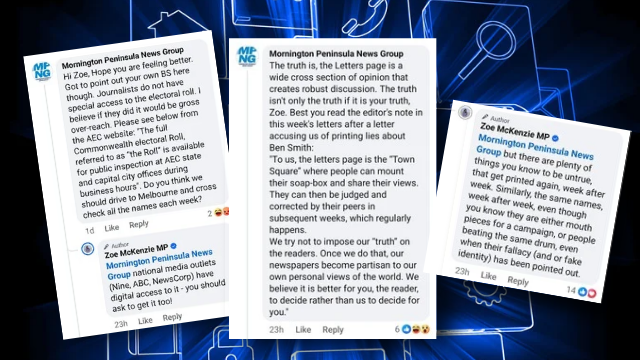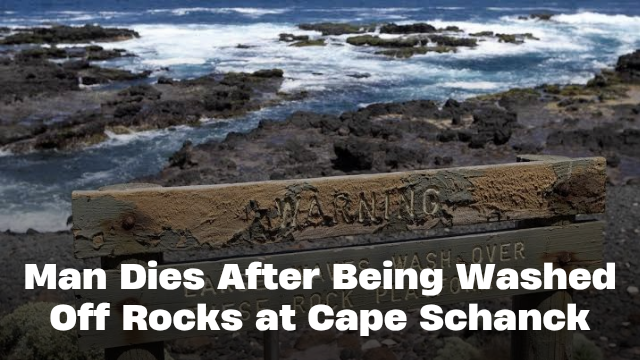Mornington Peninsula — Liberal candidate Zoe McKenzie and the Mornington Peninsula News Group (MPNG) are continuing a public exchange over the paper’s editorial standards, with McKenzie accusing the outlet of publishing false, misleading, and self-serving content, including letters to the editor allegedly signed under fake names.
Responding to McKenzie’s criticism on Facebook, MPNG defended its position, stating:
“Journalists do not have special access to the electoral roll… Do you think we should drive to Melbourne and cross-check all the names each week?”
The publication cited Australian Electoral Commission (AEC) guidelines, noting that the full electoral roll is only available for public inspection at designated AEC offices and cannot be accessed digitally by journalists or publishers. According to the AEC, journalists have no special access and may only inspect the roll in person, without photographing or copying its contents (AEC – About the Electoral Roll).
McKenzie responded that while members of Parliament and political parties do have digital access, journalists are not afforded the same privilege — a point she argues should prompt media outlets to apply more rigorous standards when publishing potentially sensitive letters.
In defence of its editorial approach, MPNG said:
“The Letters page is a wide cross section of opinion that creates robust discussion… We try not to impose our ‘truth’ on the readers… We believe it is better for you, the reader, to decide rather than us to decide for you.”
However, McKenzie pushed back, alleging that the outlet is knowingly printing inaccurate or politically motivated content:
“There are plenty of things you know to be untrue that get printed again, week after week… even when their fallacy (and or fake identity) has been pointed out.”
She has also raised concerns that some of the letters serve self-interested narratives while being published under names not found on the electoral roll, potentially undermining transparency and public trust.


Legal implications for publishers
Under Australian defamation law, a publisher can be held legally responsible for defamatory material — even if it originates from a third party, such as a letter to the editor. The High Court ruling in Fairfax Media Publications Pty Ltd v Voller [2021] HCA 27 confirmed that media outlets are liable for defamatory content they choose to publish, including user-generated or third-party submissions.
Publishing under a false or unverifiable name can heighten that risk. While defences such as honest opinion or public interest may apply, they rely on the publisher having acted reasonably and verified the content prior to publication (Federal Court of Australia – Voller Case; UNSW Media Law Handbook).
STPL News policy: strict author verification and compliance with APC standards
At STPL News, all Letters to the Editor must be accompanied by verifiable contact information, and authors are required to confirm their identity before publication. This editorial policy ensures transparency, guards against misinformation, and protects the integrity of community dialogue — especially during election periods.
This is also why STPL News strictly adheres to the policies and Standards of Practice set out by the Australian Press Council, which call for fairness, accuracy, verification, and accountability in all forms of published content.
Rising scrutiny ahead of election
McKenzie has previously criticised MPNG for publishing inaccurate claims about her residency and political history, and more recently for running a letter falsely linking her to the Port of Darwin lease — a claim she denies entirely.
While MPNG maintains that it provides a platform for public discourse, the ongoing dispute has sharpened focus on the responsibility of local media to ensure factual accuracy and editorial accountability. With the 2025 federal election fast approaching, the situation underscores a growing expectation that publishers properly vet public contributions and avoid amplifying anonymous or misleading commentary.






8 Responses
Zoe is scared and attacking the press, concerned or engaged community members is straight out of the trump playbook.
Perhaps, however FAKE NEWS should be called out and, in this instance, the publisher in question has behaved poorly.
Lies she’s calling out lies so guessing you support Ben smith lol
Hi Rowan, thanks for your comment. Just to clarify, it was the Mornington Peninsula News (MPNG) that are the ones that printed and published the alleged misleading information that was called out by Zoe McKenzie. I hope that it’s clear that STPL News does not condone the spreading of misinformation and fake news.
I’d be scared if so many people were telling lies about me and my actions. You should know that as you are a lover of Trump style leadership.
Zoe didn’t mind sending out electioneering material that looked like a newspaper nor sending out postal vote applications that went back to Liberal HQ without clearly disclosing that people’s information would be collected by the Liberals
Seems like she’s used a bit of misdirection herself.
interesting that none of my comments are on here
All comments have to be approved before being published – your comment was made at 3.29am – you have not published any other comments.